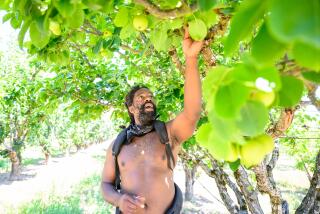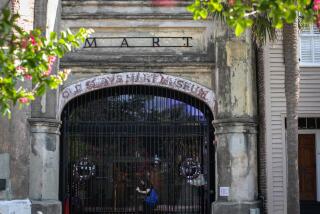Bible Emphasizes Roles of Blacks, Africa in History
When real estate developer Karen Bunkley bought a copy of the Original African Heritage Study Bible for a class at Holman United Methodist Church in Los Angeles two years ago, she couldn’t put it down.
The text is the King James Version. But, in a marked departure from traditional Bibles, it highlights all the passages that refer to Africa or Africans and includes commentaries putting such history and culture into context. It also contains maps of Africa and illustrations of Bible characters -- Moses, Jesus, Mary -- all with dark skin and curly hair.
“It was just so rewarding to see that my history began long ago, that we were there in the biblical times,” said Bunkley, 30, who was among the 100 people honored last week for completing a four-year discipleship class that used the African heritage Bible as a study aid. “You’d never know that ... watching ‘The Ten Commandments.’ ”
Perry Murrell, another Holman member and a veteran Sunday school teacher, said his discovery of the African heritage Bible 12 years ago, soon after its publication, was like “finding a treasure chest of African history.”
“I said, ‘Hey, why hadn’t anybody thought of doing this before?’ ” Murrell recalled. “For so long, we were told we really had no place in the Bible.”
Increasingly, that Bible is becoming an important study resource among African American Christians, pastors say.
The African heritage Bible’s general editor, the Rev. Cain Hope Felder, said it was created because of “the refusal on the part of the dominant society to admit that all of God’s people are equal.”
“We are trying to challenge these latter days, this Europeanization of the whole Bible, which is perpetuated even by the Vatican on one hand, Hollywood on the other,” Felder, a professor of New Testament languages and literature at Howard University and an ordained United Methodist minister, said in an interview.
“So, everybody in the Bible is thought of as white. It’s reflected in all the Catholic statuary. We just say, ‘Enough already.’ That’s simply not historically accurate.”
To Felder and other Afro-centrists, the definition of Africa includes Egypt and what is now Israel and Arab states.
The book’s Afro-centric approach stresses in commentaries that Moses’ wife, Zipporah, was an Egyptian; that Abraham’s mistress, Hagar, was an Egyptian slave girl who bore him his first son, Ishmael; and that Mary probably was dark-skinned, given her hometown (in today’s Yemen) and background.
It renounces the “Europeanization” of the Bible and Christianity through art and academia. It also includes sections on African women in the Bible, 25 original slave songs and 101 favorite black verses in the African diaspora.
It was published initially in 1993 by James C. Winston Publishing Co., and the copyright was subsequently bought by World Bible Publishers Inc. The Bible (a hardback listed at $39.95) has sold more than 500,000 copies, according to Felder.
In their introduction, Felder and nine other theologians and clergy who were contributors write: “We believe it important to stress that our research is not presented from a racist viewpoint, but rather from the viewpoint of racial pluralism and inclusiveness, seeking to bring forth the truth from a story which has had many dubious interpretations.”
Other Bible editions cater to the black community, including the African American Jubilee Bible, published by the American Bible Society in 2000. But the Original African Heritage Study Bible is the most Afro-centric of them, experts say.
The Rev. Henry L. Masters Sr., Holman’s senior pastor, says the students in the church’s discipleship class also use several other translations but find the Original African Heritage Study Bible to be invaluable.
“It traces the places where persons of African descent are mentioned in the Bible but would not be known to the average reader,” he said.
The Old Testament mentions Ethiopia more than 40 times and Egypt more than 100 times, according to the African heritage Bible.
Masters said the heritage Bible is especially helpful to younger blacks who may be disaffected from religion.
“It gives them a fresh look at the church from another historical vantage point,” he said. “Their eyes light up when they learn that Africans were kings and queens in ancient history” and “connect with history in a much more positive way and have a greater appreciation for who they are.”
Students at Holman also use Masters’ book, “Simon of Cyrene,” which makes a case that the man who was drafted to help Jesus carry the cross was a black man from the African city of Cyrene, not a Jew from North Africa as is widely believed.
Vincent L. Wimbush, a professor of religion at Claremont Graduate University, says his view of the African heritage study Bible is “mixed.”
“I see the project as a response -- almost a desperate cry on the part of people away from the center of the discourse about the Bible,” he said.
In trying to correct the “Europeanization” of the Bible, however, they may be making the same mistakes that Europeans made by whitening the Bible, Wimbush said.
“That just leaves us playing the same kind of the game: Mine is better than yours,” he said. “I think that whole game is flawed, suspect and dangerous.”
Felder said he didn’t believe everybody in the Bible was black, nor does his edition try to present things that way.
But, he said, the African heritage Bible is a strategy to remind the majority culture that it needs to “darken up” some Biblical characters before Afro-centric theologians “lighten up” theirs.
The Rev. Frank Portee III, senior pastor of the Church of the Redeemer, a predominantly black Presbyterian church in South Los Angeles, says he does not use that version of the Bible at his church, but he has studied it and sees its value in correcting European bias in scholarship.
“What it does is lift up the fact that Africans are in the Bible,” Portee said. “But the publisher of this Bible went too far by blackening everybody in the biblical text,” he said. Still, he added: “With all of its defects, the African heritage Bible is still a treasured item among black church circles.”
At Holman United Methodist in the West Adams district, Bunkley said the Original African Heritage Study Bible has been an important companion in her spiritual journey.
“I look forward to studying -- going deeper into my study and worship,” Bunkley said.


